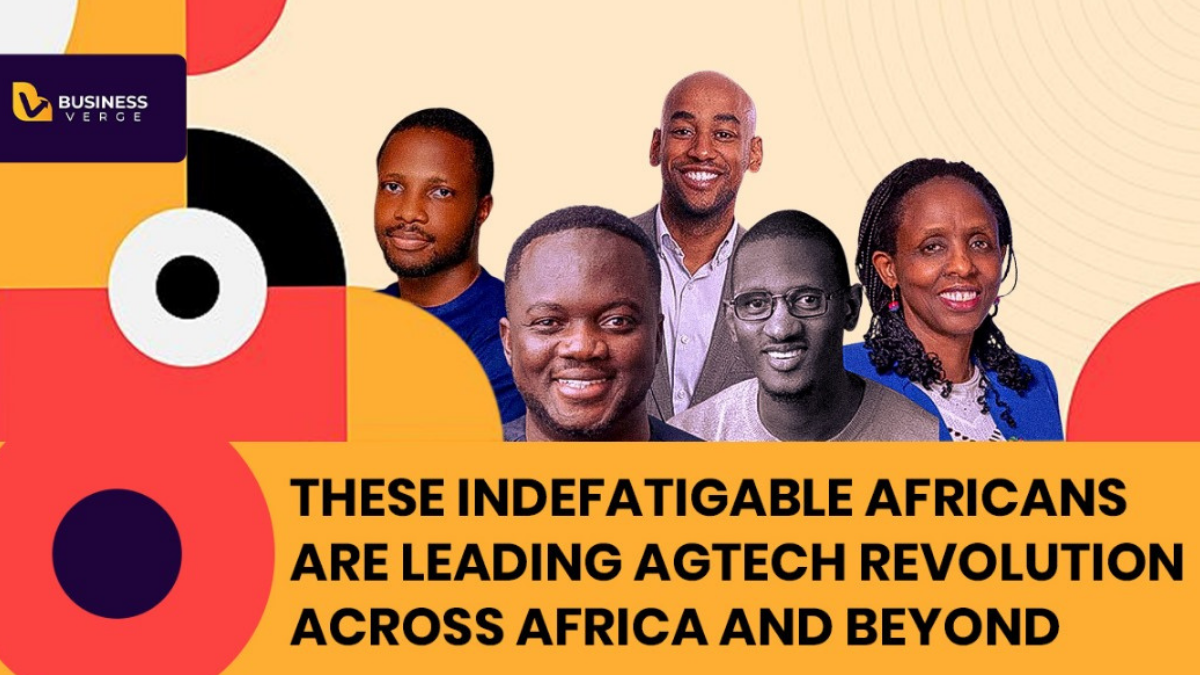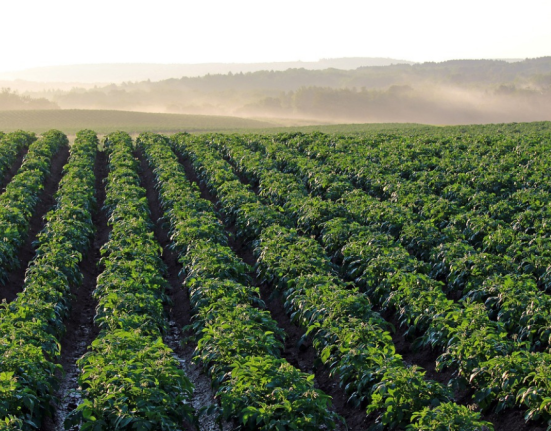If Agriculture goes wrong, nothing else will have a chance to go right.
m. s swaminathan
Africa’s agriculture sector has historically been the backbone of its economy, providing livelihoods for over 60% of the continent’s population. Yet, despite its vast arable land and agricultural potential, Africa has faced challenges that limit its productivity—ranging from outdated farming methods to unpredictable weather patterns caused by climate change. In response to these challenges, a group of innovative African leaders are at the forefront of a revolution in agricultural technology (AgTech). These trailblazers are transforming how farming is done across Africa, deploying cutting-edge technologies, and reshaping the agricultural landscape to ensure food security and economic resilience.
Among the many, five individuals stand out for their extraordinary contributions: Alloysius Attah, Nasir Yammama, Riches Attai, Jehiel Oliver, and Agnes Kalibata. Each of them, driven by personal motivations and a commitment to uplift their communities, is leading transformative initiatives that are empowering African farmers and introducing global solutions to age-old challenges.
1. Alloysius Attah
Background
Alloysius Attah, a native of Ghana, grew up seeing the daily struggles of smallholder farmers like his parents. With no access to timely weather updates or market prices, farmers were often left vulnerable, producing yields that barely met subsistence needs. Driven by a desire to address these gaps, Attah co-founded Farmerline in 2013, a company that would use mobile technology to deliver essential agricultural information directly to farmers’ phones.
Key Contributions
Farmerline’s core product is its Mergdata platform, a mobile-based system that provides farmers with real-time weather forecasts, farming tips, and market price information in their local languages. This platform also enables agricultural organisations to collect data and track the activities of their farmers, ensuring more efficient services and support. What’s groundbreaking about Farmerline is its focus on voice messages, allowing even illiterate farmers to benefit from modern technology. By 2020, the company had scaled operations to reach over 1.7 million farmers across multiple countries, including Ghana, Sierra Leone, and Cameroon.
Impact on Africa
Through Farmerline, smallholder farmers have been able to access critical inputs like high-quality seeds and fertilisers at affordable prices. The platform has empowered these farmers to increase their yields by 55% on average, translating to higher incomes and improved food security. Additionally, by ensuring that farmers are better informed about market trends, Farmerline has helped farmers secure better prices for their produce, breaking the cycle of poverty that has plagued small-scale farming for generations.
Global Reach
Farmerline has received attention from global organisations such as Mastercard Foundation and USAID, leading to partnerships that have enabled the company to expand its services. The recognition of Farmerline’s innovative approach has also earned Attah accolades, including being named in Forbes 30 Under 30 for social entrepreneurs in Africa.
Vision for the Future
Alloysius Attah’s vision extends beyond Ghana. He hopes to scale Farmerline across all of sub-Saharan Africa, building an inclusive digital ecosystem that ensures every farmer has access to the information, markets, and inputs they need to thrive. His ultimate goal is to digitise Africa’s agricultural sector, reducing inefficiencies and making farming more profitable and sustainable.
2. Nasir Yammama
Background
Born in northern Nigeria, Nasir Yammama was keenly aware of the struggles that farmers in his community faced—lack of access to modern farming techniques, fluctuating market prices, and extreme weather patterns exacerbated by climate change. His background in creative technology inspired him to bridge the gap between farmers and the resources they needed to succeed. In 2015, Yammama founded Verdant Agritech, a digital platform that integrates technology to offer comprehensive solutions for smallholder farmers.
Key Contributions
Verdant Agritech employs a range of technologies, including satellite imagery, drone technology, and data analytics, to provide precision farming tools to farmers. Through the Verdant mobile app, farmers receive detailed weather forecasts, soil health data, and personalised advice on which crops to plant and when. The app also helps farmers track their expenses, optimise irrigation, and reduce post-harvest losses.
What sets Verdant apart is its use of artificial intelligence to analyse the data collected from farmers and generate insights that help farmers make smarter decisions. In addition, Verdant connects farmers to suppliers and buyers, cutting out middlemen and ensuring that farmers receive fair prices for their produce.
Impact on Africa
Verdant has directly impacted over 50,000 farmers in Nigeria, enabling them to double their yields and significantly improve their incomes. By reducing inefficiencies in the supply chain and promoting sustainable farming practices, Verdant has also played a critical role in improving food security. The platform’s data-driven approach helps farmers use fewer inputs, such as water and fertilisers, reducing their environmental impact while increasing productivity.
Global Reach
Verdant’s success has attracted international recognition, with Yammama receiving numerous awards, including the Queen’s Young Leader Award and being named a Global Ambassador for the United Nations’ Sustainable Development Goals (SDGs). The company is now exploring opportunities to expand into other African markets, such as Kenya and Ethiopia.
Vision for the Future
Yammama envisions a future where every African farmer has access to digital tools that can revolutionise their productivity and sustainability. He is focused on building partnerships with governments, development organisations, and financial institutions to scale Verdant Agritech’s reach and impact across Africa.
3. Riches Attai:
.
Background
Riches Attai, a Cameroonian entrepreneur, grew up in a rural community where access to financial services was nearly non-existent. Smallholder farmers like his family members had no access to credit, limiting their ability to invest in high-quality seeds, fertilisers, and modern farming equipment. Attai is the CEO of Agrix Tech, an AgTech company focused on empowering smallholder farmers through access to finance and market integration.
Key Contributions
Agrix Tech developed an AI-powered platform that helps farmers connect with financiers and agricultural experts. Through a proprietary credit-scoring system based on farm data, the platform facilitates micro-loans for farmers, enabling them to purchase seeds, fertilisers, and farming equipment. Attai’s platform is centered around agricultural finance and creating access to credit for smallholder farmers.
Attai’s platform is centered around agricultural finance and creating access to credit for smallholder farmers. The platform also integrates market access features that allow farmers to sell their produce directly to buyers, cutting out middlemen and improving their profit margins.
Through his company, he developed an innovative micro-lending system that allows farmers to access affordable loans based on their production history and potential yields. The platform also helps farmers pool their resources into cooperatives, reducing risk and increasing their chances of receiving credit.
Beyond financing, Attai’s company offers tools that help farmers manage their finances, track their expenses, and plan for future investments. The platform has also integrated insurance products, allowing farmers to protect themselves against crop failure due to unpredictable weather.
Impact on Africa
By democratising access to finance, Riches Attai’s work has unlocked new economic opportunities for thousands of smallholder farmers in Central and West Africa. His micro-lending platform has financed over 20,000 farmers, enabling them to increase their productivity by 40%. The platform’s focus on financial literacy has also empowered farmers to make smarter investment decisions, contributing to long-term economic growth in their communities.
Global Reach
Attai’s work has attracted the attention of international development agencies, including the International Fund for Agricultural Development (IFAD), which has partnered with his company to scale financial solutions for farmers across Africa.
Vision for the Future
Attai believes that by expanding access to finance, African farmers will be able to grow their businesses, invest in sustainable farming practices, and contribute to regional food security. His goal is to scale Agrix Tech to 1 million farmers by 2028, ensuring that no farmer is left behind in the digital agricultural revolution.
4. Jehiel Oliver
Background
Jehiel Oliver, an American-born entrepreneur with deep ties to Africa, founded Hello Tractor to address the mechanization gap in African farming. Smallholder farmers, who make up more than 80% of the agricultural workforce, often lack access to tractors and other machinery due to high costs. Oliver’s innovative solution uses a shared economy model, often likened to Uber for tractors, to provide affordable, on-demand access to tractors.
Key Contributions
Hello Tractor connects tractor owners with smallholder farmers via a mobile platform. Farmers can book tractor services for plowing, planting, and harvesting, while tractor owners can maximise their machine utilisation by renting them out when not in use. The platform also uses GPS and data analytics to track tractors in real time, ensuring proper maintenance and preventing machine theft.
Impact on Africa
Since its launch, Hello Tractor has supported over 500,000 farmers in countries such as Nigeria, Kenya, and Mozambique, increasing their productivity by as much as 200%. The introduction of mechanisation has reduced labour costs and increased crop yields, allowing farmers to farm larger areas of land more efficiently. Oliver’s work has also improved tractor utilisation rates, making mechanisation a viable business for tractor owners.
Global Reach
Hello Tractor’s model has attracted partnerships with global players like John Deere, one of the largest agricultural machinery manufacturers in the world. This partnership has enabled Hello Tractor to scale across multiple African countries, with plans to expand into Southeast Asia.
Vision for the Future
Jehiel Oliver aims to bring mechanisation to 10 million smallholder farmers across Africa by 2030. He believes that widespread access to affordable tractor services will revolutionise African agriculture, helping the continent achieve food security and boosting economic development.
5. Agnes Kalibata
Background
Agnes Kalibata, the president of the Alliance for a Green Revolution in Africa (AGRA), is one of the most influential figures in African agriculture today. A former Minister of Agriculture in Rwanda, Kalibata has spent decades working on agricultural policy, research, and development, with a focus on improving food security and promoting sustainable farming practices.
Key Contributions
At AGRA, Kalibata has spearheaded initiatives that provide smallholder farmers with access to improved seeds, fertilisers, and financing. Under her leadership, AGRA has supported the development of over 650,000 agricultural businesses across 18 African countries, contributing to significant increases in crop productivity and income for farmers. She has also played a pivotal role in shaping Africa’s agricultural policy, advocating for government investments in agriculture, rural infrastructure, and market access.
Impact on Africa
Kalibata’s work has directly impacted the lives of more than 30 million farmers. Her policy initiatives have led to improved access to agricultural inputs, better infrastructure for food distribution, and the development of more resilient farming systems in the face of climate change. Her advocacy for sustainable agricultural practices has also placed Africa at the forefront of the global conversation on climate-smart agriculture.
Global Reach
In addition to her work at AGRA, Kalibata was appointed as the UN Special Envoy for the 2021 Food Systems Summit, where she worked with global leaders to create a more inclusive and sustainable global food system. She has received numerous international awards for her contributions to agriculture, including the Yara Prize and the Africa Food Prize.
Vision for the Future
Kalibata’s vision is to create an agricultural system that not only feeds Africa but also contributes to global food security. She advocates for increased investment in African agriculture and believes that with the right policies and innovations, Africa can become a major player in the global food market by 2040.
The leaders profiled here are just a few of the many innovators driving the AgTech revolution in Africa. Through their work, they are transforming smallholder farming, improving food security, and positioning Africa as a leader in global agriculture. As they continue to scale their solutions and influence agricultural policy, the future of farming in Africa looks bright—powered by technology, innovation, and the vision of these indefatigable pioneers.








Leave feedback about this